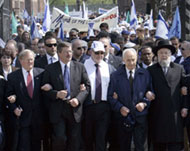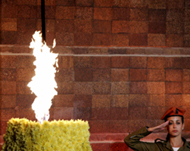Poverty stalks Holocaust survivors
Thousands of people have taken part in Holocaust remembrance ceremonies in Israel and elsewhere but official figures reveal that, over 60 years on, around 90,000 survivors live in poverty.

Israelis marked the day, which began at sunset on Monday by closing places of entertainment such as bars and discos.
Stories of survivors were broadcast on radio and television and at midmorning on Tuesday air raid sirens sounded to mark a two-minute silence for the six million Jews killed in World War II.
Israeli officials warned in speeches that anti-Semitism has not yet been eradicated in the world.
In Poland around 7,000 people attended the annual march through the deadly Auschwitz-Birkenau death camp.
The sounding of a ram’s horn signalled the start of the march on Tuesday which was mainly comprised of 5,000 young Israelis and their teachers. They were accompanied by 1,000 Poles and 1,000 other marchers from various countries.
Child victims
The names of a handful of the estimated 1.5 million child victims of the Holocaust were solemnly read out.
Then, the first group of around 10 marchers, carrying the banner of the March of the Living, filed beneath the haunting “Arbeit Macht Frei” sign at the exit of Auschwitz and onto the roads of the southern Polish town of Oswiecim for the 3km walk to Birkenau’s gas chambers.
Around 100 metres behind the leaders followed a group of VIPs, including Shimon Peres, the former Israeli prime minister.
 |
|
Peres (2nd R) was among |
But Gizela Burg, who arrived in Israel after surviving four Nazi concentration camps, was unable to take part in any memorial activities.
At age 83 Burg’s survival problems continue as she can no longer afford to pay her medical bills.
Israel is having trouble caring for ageing Holocaust survivors, as their medical bills grow each year.
The country has received close to $80 billion in compensation from Germany over the years and, according to figures from the Finance Ministry, gives $326 million to survivors every year.
But many survivors say the money is not nearly enough to live on.
An organisation called the Holocaust Survivors’ Welfare Fund distributes government aid to pay medical costs, but its budget in recent years has not grown in proportion to the need.
Cash crunch
Less than 10% of the fund’s annual $35 million budget comes from the government.
Up to 85% of the fund’s money comes from a New York based Claims Conference, whose funding comes mostly from Germany and Austria.
The Israeli government has increased funding for the organisation in recent years, but most of the funds for 2006 have not yet come through.
About 10,000 survivors who are eligible for medical aid are not receiving it, said the chairman of the fund, Zeev Factor, 80 and himself a Holocaust survivor.
 |
|
Many Holocaust survivors are too |
“These people are barely surviving, but the crisis begins when a real sickness befalls them,” he said.
“The government of Israel has received money from the German government … but I think the government didn’t use enough for the survivors.”
Like many others who survived the war and moved to Israel, Burg took a job with a modest salary, as a doctor’s assistant, and had even set some money aside for retirement.
Her husband, a car mechanic, died of cancer 22 years ago. Her savings ran out after three eye operations.
Now she chooses to pay $1,300 for dental treatment instead of putting meat on her table or fixing her TV. The fund had hoped to pay for the work on her teeth but could not, she said.
“I don’t pay for medicine because I have to pay for electricity and for gas and property taxes,” she said.